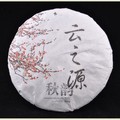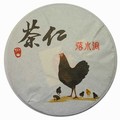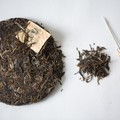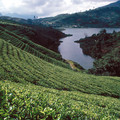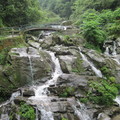Pu-erh - Yìwǔ - 2012
Tea by type
Tea by region
Tea by years and other
2012 Yunnan Sourcing "Qiu Yun" Wild Arbor Raw Pu-erh tea of Yi Wu mountain
 1 review
1 reviewLate autumn harvest tea from wild arbor tea trees (between 60 and 80 year old) growing in the area of Yi Bi village of Yi Wu county. Entirely no spray tea from one family's tea garden. Hand-processed from start to finish, but without any smokiness! Classic Yi Wu taste, thick and full in the mouth. Sweet after-taste with some grass and mushroom notes. Qiu Yun (秋韵) means "Song of Autumn"
Luo Shui Dong 2012 Spring
 1 review
1 reviewThis cake is made from high quality gushu leaves sourced from Luo Shui Dong 落水洞 - a famous puer producing village in Yiwu. The farmers here are primarily Han ethnicity, known for their excellent hand-processing technique. This early spring tea produces is a clear bright yellow liquor, with a sweet, buttery mouthfeel. Because it is easy to drink when young, Luo Shui Dong is a good entry point for those new to sheng (raw) puer, or those who don’t like bitter or astringent flavors.
YiWu 2012 autumn
 1 review
1 reviewpressed by stone mold into 250 grams cakes, autumn maocha Massive sweetishness in the back of the mouth, already like in throat, fruity tones, buttery-biscuit like texture. The exact whereabouts of this tea garden is not known even to my 'buyer' friend in Jinghong
2012 Chawangpu Yiwu Zhangjiawan Gu Shu Xiao Bing Cha 200g
 0 reviews
0 reviewsOur Yiwu gushu for this year comes from an old village in Mansa area - Zhang Jia Wan Lao Zhai (张家湾老寨). Zhang Jia Wan Lao Zhai is a village more than 30km away from Yiwu town, and 13km from Zhang Jia Wan Xin Zhai(张家湾新寨), bordering Laos in the south. There is big area of ancient tea trees garden. Many of them was chopped down or burned around 1981. The stance to "gu cha shu" was very different at that time. Maocha cost only a fraction of today's price and old high trees were a...
Theme
Quotes
„Or perhaps you experiment with different parameters, water, ware, etc. and notice that it performs differently under different circumstances. This type of knowledge is not possible if you only have 25g of a tea. It can really only come with drinking 200, 300, or even 1000g of the same tea.“
Latest posts
01.01.2016 @ 18:14:35 - Eternal Spring:
WeRateTea.com wish you all the best for 2016!...
07.12.2015 @ 09:07:02 - sypalino:
I decided to taste this tea 2 weeks after delivery. The cake is lightly pressed, so...
09.11.2015 @ 21:58:19 - Eternal Spring:
Comparison of 2013 Bada Pu-erh.sk with <a...
09.11.2015 @ 09:34:07 - Eternal Spring:
Lao Yu 2013 is now about 2,5 years old tea and out of this 1,5 year stored in Europe....
09.11.2015 @ 09:33:11 - Eternal Spring:
Comparison of all three Lao Yu is now done :)
15.10.2015 @ 11:06:37 - Eternal Spring:
2015 Chawangpu Collection – I can only tell, that all teas are very good :)
09.10.2015 @ 10:31:19 - Eternal Spring:
It was quite long and difficult tasting to make a decision… There is still quite...
24.01.2015 @ 16:55:57 - Eternal Spring:
WeRateTea.com wish you all the best for 2015!...
30.12.2014 @ 17:19:22 - Eternal Spring:
"FT(For Taiwan)" means this brick was a special order of "Fei Tai" Company. Fei Tai...
13.08.2014 @ 18:24:28 - Eternal Spring:
We compared two teas from Youle. 2005 Jinuo Shan You Le "Red Sun Drum" and 2009...
Tea by region
We will help you with tea selection.
Do you like quality loose tea?
We will help you to find the right one for you. Be inspired by tea ratings of other tea lovers. Rating stars could help you.


Review your cup of tea.
Review the tea you are drinking and help other tea lovers to find the right cup of tea.






 Shops
Shops
